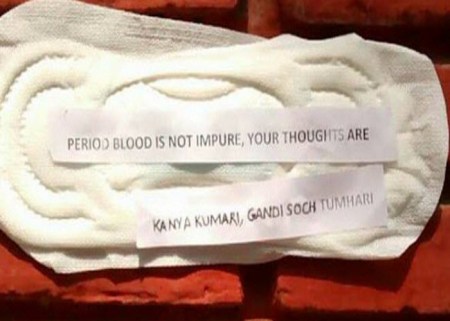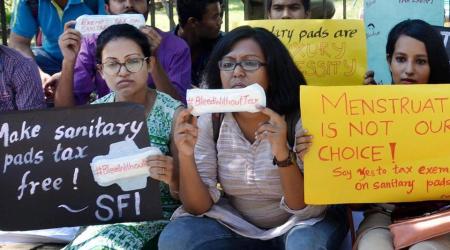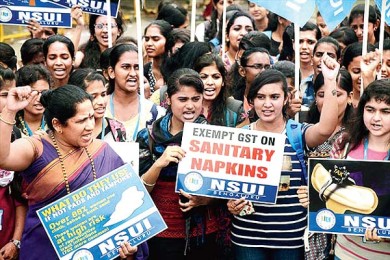Menstruation Still A Taboo In India
Menstruation is a taboo in India, although women have no control over this ‘natural biological process’. It’s unfortunate that the majority of women in India face various (social) problems during their menstrual cycle and it is another form of sexual abuse.
Students of Jamia Milia Islamia University (in New Delhi), Delhi University and Jadavpur University (in Kolkata) recently organised protest rallies inside their campuses against such abuse under the banner ‘#PadAgainstsexism’. Several articles on this particular issue have also been published in the social media to sensitise common people.

An Instagram photo of 24-year-old Canadian poet, writer, illustrator and performer Rupi Kaur on her period has been at the centre of controversy for a long time. In fact, Instagram removed the photo twice, saying that it was a ‘provocative’ image aimed at challenging the taboos surrounding menstruation. In the southern Indian province of Kerala, female workers of a factory recently staged a protest against strip search in a unique way – by writing comments on sanitary napkins.

Rupi Kaur – The image was removed twice by Instagram
These incidents show that menstruation is still considered a taboo in India. That’s why a senior official of Sabarimala Temple (in Kerala) tried to justify the concerned authorities’ decision to impose a ban on women of menstrual age from entering the temple, saying: “There will be a day when a machine is invented to scan if it is the ‘right time’ (not menstruating) for a woman to enter the temple. When that machine is invented, we will talk about letting women inside.” Some women’s organisations, using the hashtag #happytobleed, condemned the ‘sexist’ statement issued by the temple official in 2016 and made a stand against ‘rules’ introduced by the Sabarimala authorities.

Of course, menstruation is a taboo in India. Otherwise, why did the Indian government impose Goods and Services Tax (GST) on sanitary napkins, instead of providing women with napkins free of cost? Students of Presidency University in Kolkata recently asked the government to install automated sanitary napkin vending machine and incinerators in all state-run colleges across the country. “The purpose is to promote safe and hygienic sanitary practices among the women and girls,” said a student.

In India, menstruation is definitely a taboo. So, working ladies have to ‘manage’ leaves for at least two days every month in this country. In recent times, two private organisations in Mumbai have announced a monthly paid leave on the first day of the period for female workers. Others are not so lucky. They have no other option, but to go to office on those days. It’s a fact that Serena Williams was pregnant when she won her 23rd grand slam title in Melbourne. It reminds us how amazing women’s bodies are. At the same time, Serena’s achievement encourages state-run and private organisations in India not to change their leave policy, as they think that women should not get leaves for a “short period of pain”.

Arguments in favour of or against menstrual leave are versatile in nature (across the globe). In the 19th century, the medical science claimed that women could not do the same thing as men due to their physical and mental characteristics. Once, Professor of Medical Science at Harvard University Edward Clarke said that women were not suitable for jobs because of their ‘monthly period’. In his publications ‘A Fair Chance for Girls’ and ‘Sex in Education’ (published in 1873 and 1884, respectively), Dr Clarke wrote: “There have been instances, and I have seen such, of females… graduated from school or college excellent scholars, but with undeveloped ovaries. Later they married and were sterile.” What he really wanted to say is: “exerting oneself while on the rag is dangerous. Therefore, educating women is dangerous. For a woman’s own safety, she should not pursue higher education. Or else, the womb will be at stake.” (Source: The Godmother of American Medicine)

Women had to fight hard in order to enjoy “equal rights” as men from this (above mentioned) situation. So, it is quite natural that some ‘feminist’ writers or intellectuals will oppose the idea of paid leaves for women during their monthly period. In 2013, feminists opposed the Russian Parliament’s move to pass a Bill, allowing women to get one-day menstrual leave in a month. Marina Pisklakova-Parker, head of women’s group ‘Anna Centre’, said: “If we are seriously debating women’s efficiency at work during menstruation, we should also consider how fit for work men are after a drinking bout.” Finally, the Parliament failed to pass the Bill and the lawmaker, who proposed the Bill, was accused of sexism.

Image courtesy: http://www.rupikaur.com/
Feminism typically refers to gender equality especially with respect to rights for females, although many feminist movements and ideologies differ on exactly which claims and strategies are vital and justifiable to achieve equality. Tineke M Willemsen, the Chair of Women’s Studies at Tilburg University, stressed: “It is hardly even possible to give a definition of feminism that every feminist will agree with.” Feminists forget the fact that the female workers usually join a workforce that is designed especially for males (even in the modern world). So, women have to become ‘like men’ in order to survive in an organisation. According to a report prepared by a feminist organisation based in southern Indian province of Tamil Nadu, male managers always monitor movements of female workers in garment factories so that they don’t talk too much and don’t ‘waste’ time in the washroom ‘unnecessarily’.

In such a situation, we can’t expect that the corporate sector will provide sanitary napkins to female workers. It is important for the Indian government to follow Italy, China, Japan and South Korea’s path. While Italy is all set to become the first European country to offer paid menstrual leave to all female employees, parts of China, Japan and South Korea have already implemented similar laws. Some renowned private companies, like Nike, have introduced the menstrual leave for their female employees in recent times. Indian women, too, have every right to enjoy paid menstrual leave.
For that, a change in our mentality is required. In an article titled ‘If Men Could Menstruate’, feminist Gloria Steinem writes: “What would happen, for instance, if suddenly, magically, men could menstruate and women could not?” She adds: “Male human beings have built whole cultures around the idea that penis-envy is ‘natural’ to women, though having such an unprotected organ might be said to make men vulnerable, and the power to give birth makes womb-envy at least as logical.” Gedis Grudzinskas, a specialist in obstetrics and gynaecology, thinks as premenstrual syndrome makes most of the women upset (physically and mentally), at least a three-day leave during this period encourages them and helps increase their productivity at workplaces.
Boundless Ocean of Politics on Facebook: https://www.facebook.com/boundlessoceanofpolitics/
Boundless Ocean of Politics on Google Plus:
https://plus.google.com/+KoushikDasboundless
Boundless Ocean of Politics on Twitter:
https://twitter.com/kousdas?s=09
Contact us: kousdas@gmail.com


I was curious if you ever considered changing the structure of your site?
Its very well written; I love what youve got to say. But maybe you could a
little more in the way of content so people could connect with it better.
Youve got an awful lot of text for only having 1 or
two images. Maybe you could space it out better?
LikeLike
Just want to say your article is as surprising. The clearness to your put up is simply nice
and that i could think you are a professional in this subject.
Fine together with your permission allow me to seize your feed to keep up to date with forthcoming post.
Thank you a million and please keep up the rewarding work.
LikeLike